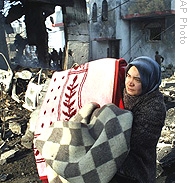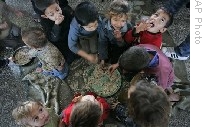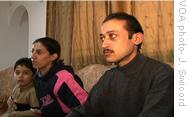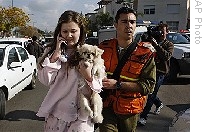VOA标准英语2009年-Gaza Fighting Inflicts Misery on Both Sides(在线收听)
 |
| A Palestinian woman carries her belongings in Rafah, after Israeli air strikes, 12 Jan 2009 |
The sounds of war are a daily reality on both sides of a bloody conflict - Palestinians in Gaza have had to live with the effects of Israeli air strikes, naval bombardments, tank fire and artillery. Israelis have been subjected to continuous rocket attacks from Palestinian militants inside Gaza.
Reports from Gaza say much of the enclave has been reduced to rubble - government buildings, police stations, mosques, smuggling tunnels, the university, the homes of senior Hamas militants - all under attack. And in the process many innocent Palestinian civilians have been caught in the crossfire.
 |
| Palestinians who fled their homes eat at a United Nations school where they are sheltering in the Jebaliya refugee camp, northern Gaza Strip, Monday, 12 Jan. 2009 |
From Gaza City, Palestinian journalist Mohammed Dawwas described what life has been like.
"It has been very difficult for us," said Mohammed Dawwas. "We have been moving every day from my house to another house, to my father-in-law's house because we think it is safer there. For my children - my kids are very worried. When it gets dark, they are very frightened. And, you have to know, we have no electricity, we have nothing here. We are just surviving, minute, hour, day by day."
Television footage shown around the region and the world, of injured civilians, bloodied children and mangled bodies recovered from the rubble of bombed buildings, of civilians killed by Israeli shells at a U.N. school. These images have outraged public opinion in the Muslim world and elsewhere.
 |
| The Dhabour family in Ramallah |
In their apartment in Ramallah, watches and worries. Ibrahim Dhabour is from Gaza and while he lives in the West Bank with his wife Suhad and their two young boys - the rest of his family is back in Gaza.
"When I see this on TV - the Israeli army killing Palestinians - men, women and children," said Ibrahim Dhabour. 'It's very difficult he says, adding his thoughts are always on what is happening in Gaza.
The only way to stay in touch is by phone.
Ibrahim Dhabour calls his mother. He asks her how the family is doing and how they are coping, what the latest news is from home. He later says she told him about the neighbors who have been killed, some by Israeli air strikes, some feared trapped under the rubble of collapsed houses.
He says she talks about the daily worries. She says there has been so much shelling that they fear the apartment building will soon collapse or might be hit at anytime. If we die, she tells him, do not worry - it is God's will.
His wife, Suhad gets on the phone to talk with her mother-in-law. She was crying, Suhad says, and her message was, "Do not worry about us, just take care of the family, your husband and the children."
Medical officials in Gaza say about 900 Palestinians have been killed and more than 3,500 injured in the Israeli attacks. At least half are believed to be civilians.
 |
| An Israeli woman, suffering from shock, is helped by a soldier after a rocket fired from the Gaza Strip hit the southern town of Sderot, Sunday, 11 Jan. 2009 |
Israeli officials insist they are not targeting civilians and say they had no choice but to launch the military offensive after talks with Hamas over the extension of a cease-fire broke down and Islamist militants stepped up rocket attacks on southern Israel.
People in Sderot have become used to air raid sirens and warnings.
Sderot lies within a few kilometers from Gaza, in plain view, and has come under sporadic rocket fire for the past eight years. It has again become a target and 23-year-old Tamara Amr says it makes daily life very difficult.
"It is not so easy to live like this for eight years," said Tamara Amr. "All my days are in fear. I am 23-years old and I am so scared to stay alone, to shower alone, to sleep. I need to be in my own place and live a normal life, but it is not."
Tamara Amr, like most average Israelis, supports the military offensive for one reason, to stop rocket attacks from Gaza.
"I hope that [it] will stop and we can live in peace and we can live a normal life," she said.
"A normal life" is a hope expressed by people on both sides of this conflict. Diplomatic efforts are underway to end the violence and for civilians -Israelis and Palestinians - a resolution cannot come soon enough.